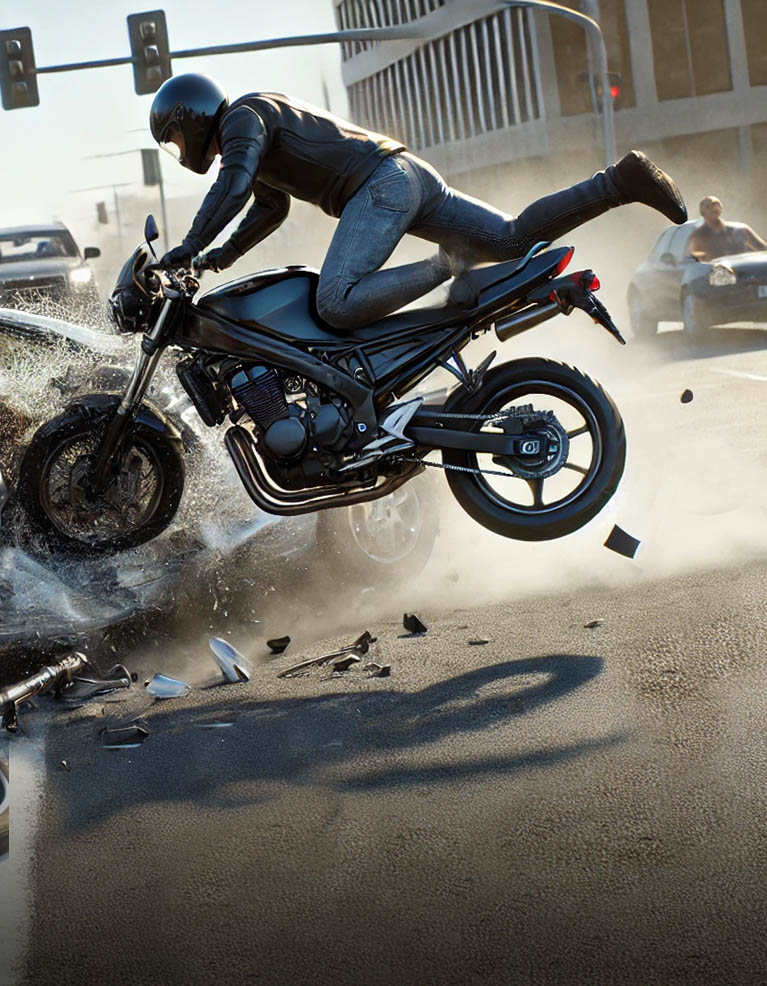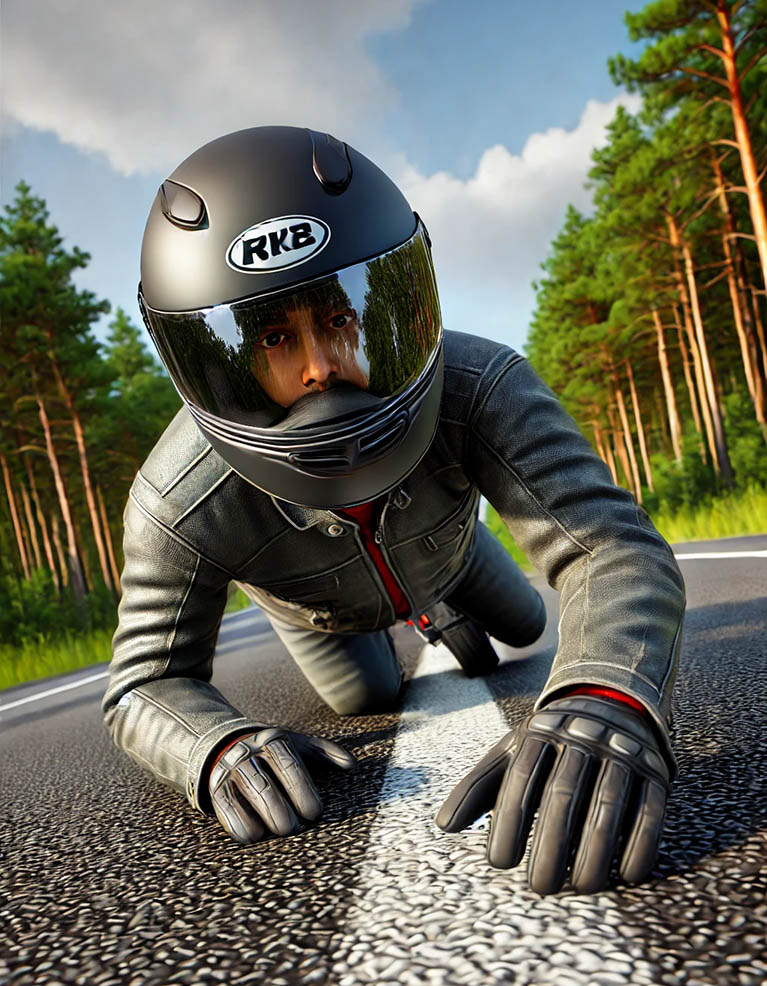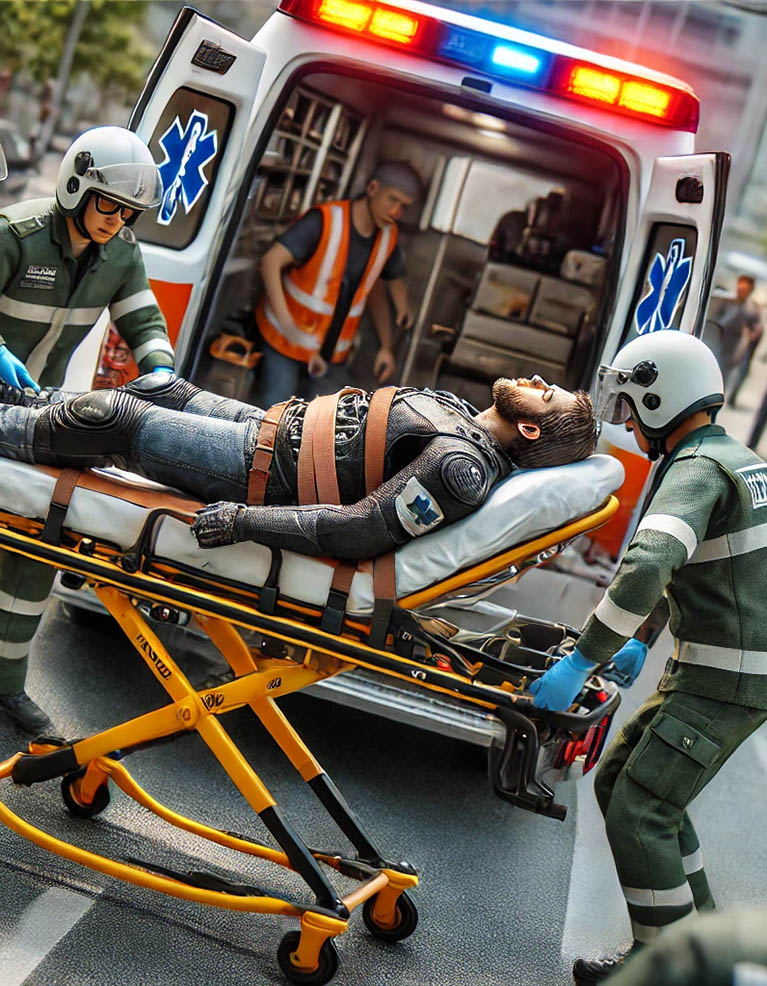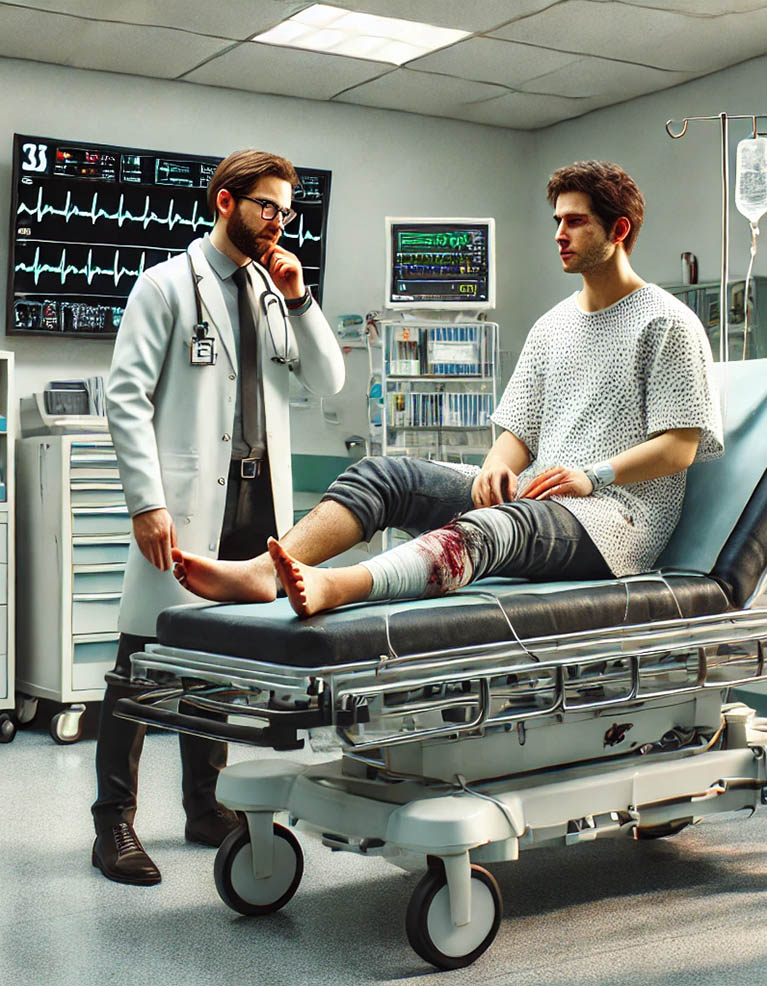Motorcycle Accident Lawyer
Motorcycling offers an exhilarating sense of freedom and adventure that few other forms of transportation can match. However, this thrill comes with significant risks. Some of my friends have described riding as therapeutic, while many of my clients have ended up needing physical therapy.
According to the National Highway Traffic Safety Administration (NHTSA), motorcyclists are approximately 28 times more likely than passenger car occupants to die in a motor vehicle crash per vehicle mile traveled. The reasons for this disparity are numerous, including the lack of protective barriers and the inherent instability of motorcycles compared to four-wheeled vehicles.
Riding a motorcycle can be incredibly thrilling, but it’s important to be aware of the risks involved. By understanding the common causes of motorcycle accidents and following recommended safety practices, riders can enjoy their journeys while reducing the likelihood of accidents. Safety gear, visibility, defensive riding, proper training, and motorcycle maintenance are all crucial aspects of a safe riding experience. As motorcycling becomes more popular, it’s increasingly important to raise awareness about these safety measures in order to promote a culture of safety and responsibility among riders.
The rules of the road apply to all drivers, and we frequently handle motorcycle accidents. Distracted driving is always a danger. If you or a loved one is injured in a motorcycle accident, you should immediately move to a safe area, call the police to file an accident report, and seek medical attention as soon as possible. Even though you may feel and look okay, many motorcycle wrecks result in life-threatening internal injuries that are not immediately evident. It’s important not to discuss your injuries with anyone other than emergency workers and your physician. In the unfortunate event of an accident, you will likely need to retain a motorcycle accident lawyer to advocate on your behalf. If possible, call one right after you contact the police. A good motorcycle accident attorney will conduct a separate investigation to determine fault and provide you with instructions on what to do next. Due to the severity of injuries sustained in motorcycle accidents, insurance companies will often try to settle these cases fast. A personal injury attorney can calculate compensation to ensure your health and well-being remain the first priority and take your case to court if required.
Who Is Liable In A Motorcycle Accident?
In a motorcycle accident, responsibility may fall on the motorcyclist, other drivers involved, local governments or municipalities, and motorcycle manufacturers or maintenance providers, depending on the specific circumstances of the crash. Factors such as speeding, reckless riding, impairment, distraction, failure to yield, aggressive driving, poor road conditions, and mechanical failures can all play a role in determining liability. Figuring out who is responsible requires a detailed investigation into the actions and contributing factors of each party involved.
Responsible parties may include:
- Motorcyclist: If they were speeding, riding recklessly, or impaired by alcohol or drugs.
- Other Drivers: If they were distracted, failed to yield, or engaged in aggressive driving behaviors.
- Local Government/Municipalities: If poor road conditions, such as potholes or inadequate signage, contributed to the accident.
- Motorcycle Manufacturers: If a mechanical defect, such as faulty brakes or a design flaw, played a role in the crash.
- Vehicle Manufacturers: If a defect in the other vehicle involved contributed to the accident.
- Maintenance Providers: If improper maintenance or repairs to the motorcycle or other vehicles involved led to the accident.
- Commercial Entities: If a commercial driver or vehicle was involved and found to be at fault due to negligent practices.
- Property Owners: If the accident was influenced by poorly maintained private property, such as gravel driveways leading onto public roads.
- Pedestrians: If a pedestrian's actions, such as jaywalking or causing an obstruction, contributed to the motorcycle accident.
- Product Manufacturers: If defective motorcycle gear, like helmets or protective clothing, failed to perform and exacerbated injuries in the accident.

Causes of Motorcycle Accidents
Motorcycle accidents usually happen because of a mix of things. One big reason is that people driving motorcycles or cars get distracted, often by using their phones or eating while driving. This makes them slower to react and more likely to miss things on the road. Driving too fast is another major problem because it makes it harder to avoid unexpected things on the road and makes accidents worse. Newer motorcycle riders are at higher risk because they might not have the skills and judgment to handle tough road situations. Also, drinking alcohol or using drugs makes accidents more likely, as it messes up a person’s coordination and decision-making. Accidents often happen when cars turn left and don’t see oncoming motorcycles. Things like potholes, gravel, and wet roads are also dangerous for motorcycles because they can cause them to crash. Bad weather like rain and fog makes it harder to see and control a motorcycle. Problems with the motorcycle, like brakes not working well or tires popping, can also lead to accidents. Lastly, dangerous driving behaviors such as following too closely and swerving through traffic make it more likely for motorcycles to crash.

Common Motorcycle Wreck Causes
- Distracted Driving: Both motorcyclists and other drivers may be distracted by mobile devices, eating, or other activities, leading to accidents.
- Speeding: High speeds reduce the time needed to react to hazards and increase the severity of crashes.
- Lane Splitting: Riding between lanes of stopped or slow-moving traffic can be dangerous due to the close proximity of vehicles and limited space.
- Inexperience: Novice riders may lack the skills and judgment needed to handle challenging road conditions or avoid hazards.
- Alcohol and Drug Impairment: Operating a motorcycle under the influence of alcohol or drugs significantly impairs coordination, judgment, and reaction times.
- Left-Turn Accidents: Many motorcycle accidents occur when a car turns left in front of an oncoming motorcycle, often due to the driver's failure to see the motorcyclist.
- Road Hazards: Potholes, gravel, wet roads, uneven pavement, and other road hazards can cause motorcyclists to lose control.
- Weather Conditions: Rain, snow, fog, and ice can make roads slippery and reduce visibility, increasing the risk of crashes.
- Mechanical Failures: Faulty brakes, tire blowouts, or other mechanical issues can lead to loss of control and accidents.
- Aggressive Driving: Tailgating, weaving in and out of traffic, and other forms of aggressive driving can lead to collisions with motorcycles.
Injuries Sustained In Motorcycle Accidents
Motorcycle accidents often result in severe injuries due to the lack of protection compared to other vehicles. Common injuries include fractures, especially in the legs and arms, as well as head injuries, even when wearing a helmet. Road rash, caused by sliding across the pavement, can lead to significant skin damage and infection. Spinal cord injuries are also a serious risk, potentially resulting in paralysis. Internal injuries, such as damage to organs and internal bleeding, are common due to the high-impact nature of motorcycle crashes. These injuries often require extensive medical treatment and can have long-lasting effects on the rider’s quality of life.
Common Motorcycle Accident Injuries
- Fractures: Particularly in the legs, arms, and wrists due to the impact and fall.
- Head Injuries: Including concussions and traumatic brain injuries, even when helmets are worn.
- Road Rash: Severe skin abrasions from sliding across the pavement, which can lead to infections.
- Spinal Cord Injuries: Potentially resulting in partial or complete paralysis.
- Internal Injuries: Damage to organs and internal bleeding caused by the force of the collision.
- Facial Injuries: Including broken jaws, teeth, and facial bones, especially if the rider is not wearing a full-face helmet.
- Dislocations: Commonly affecting the shoulders, hips, and other joints.
- Soft Tissue Injuries: Sprains, strains, and tears of muscles, tendons, and ligaments.
- Limb Amputations: In severe cases, limbs may be crushed or severely damaged, leading to amputation.
- Psychological Injuries: Including post-traumatic stress disorder (PTSD), anxiety, and depression following the trauma of the accident.

Types of Compensation for Losses in Motorcycle Wrecks
In the event of a motorcycle accident, the victims may be eligible for different types of compensation for their losses. Medical expenses are a major part of this compensation and cover hospital stays, surgeries, medication, rehabilitation, and ongoing medical care costs. Compensation can also include lost wages if the victim is unable to work due to their injuries, as well as potential loss of future earnings if the injuries lead to long-term or permanent disability. Additionally, property damage compensation handles the repair or replacement of the motorcycle and any other personal property damaged in the accident.
Apart from economic damages, victims can seek compensation for non-economic losses. Pain and suffering compensation accounts for the physical pain and emotional distress caused by the accident and injuries. This can also include compensation for the loss of enjoyment of life if the victim’s ability to participate in and enjoy daily activities is seriously impacted. In cases of wrongful death resulting from the accident, the victim’s family may be entitled to compensation for funeral expenses, loss of companionship, and loss of financial support. These types of compensation aim to provide support and relief as victims and their families deal with the aftermath of a motorcycle accident.

Common Compensation Awards
- Medical Expenses: Covers hospital stays, surgeries, doctor visits, medication, rehabilitation, and ongoing medical care.
- Lost Wages: Compensation for the income lost due to the victim's inability to work during recovery.
- Loss of Future Earnings: Addresses the potential loss of earning capacity if the injuries result in long-term or permanent disability.
- Property Damage: Covers the repair or replacement costs of the motorcycle and any other personal property damaged in the accident.
- Pain and Suffering: Compensation for the physical pain and emotional distress experienced due to the accident and injuries.
- Loss of Enjoyment of Life: Addresses the impact on the victim's ability to participate in and enjoy daily activities.
- Disability and Disfigurement: Compensation for permanent physical disabilities or disfigurements resulting from the accident.
- Rehabilitation Costs: Covers the expenses related to physical therapy, occupational therapy, and other rehabilitation services.
- Home Modification Costs: Compensation for necessary modifications to the victim's home to accommodate disabilities, such as wheelchair ramps or bathroom alterations.
- Wrongful Death: In cases where the accident results in a fatality, compensation for the victim's family for funeral expenses, loss of companionship, and loss of financial support.
Do I Need A Motorcycle Accident Lawyer?
Having a motorcycle accident lawyer in Florence, Alabama is crucial for navigating the complex legal landscape following an accident. A specialized lawyer understands the nuances of local traffic laws and regulations, which can significantly impact the outcome of your case. They can help gather and present compelling evidence, negotiate with insurance companies for fair compensation, and represent you in court if necessary.
Additionally, a local lawyer will be familiar with the tactics used by opposing parties to minimize payouts, ensuring that your rights and interests are fully protected. Their expertise can make a substantial difference in securing compensation for medical expenses, lost wages, property damage, and pain and suffering, allowing you to focus on recovery while they handle the legal challenges.
